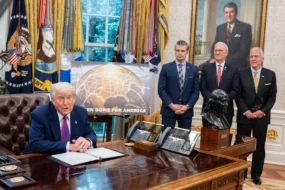When the European Union implemented the General Data Protection Regulation (GDPR) in 2018, officials in Brussels asserted that the simplified rules would benefit both Europeans wanting more control of their online personal data, and companies trying to do business across Europe.
But any improvements to privacy have come at a high cost. GDPR has hurt small- and medium-sized firms to the point of forcing market consolidation, added costs for businesses that have cascaded through the economy and affected consumer prices, and—worst of all—stifled innovation, leading to what a 2022 report called a “lost generation of innovation apps.”
The impacts have been felt globally, including by US companies and consumers. Seven years too late, Europe is looking to make changes to the regulation.
History repeats itself: Today, Europe stands poised to enact another sweeping regulation with a familiar formula—a laudable raison d’être with a reasonable-sounding goal. The EU Space Act, published in June, would establish a unified, EU-wide approach to regulating space activities, and address issues related to space safety, resiliency, and sustainability. Like GDPR, however, the space act is poised to unleash a Pandora’s box of consequences, including putting a brake on innovation and raising the costs of doing business in space.
Whether by accident or design—it should be noted that US tech companies were undeniably in the crosshairs of EU policymakers when drafting GDPR—the EU Space Act will also make it harder for American companies to sell space products, services, and data in Europe.
As the Trump administration looks to level the playing field for US companies wanting to do business abroad, it should work to ensure that American space companies are not left at a competitive disadvantage in Europe.
Global reach: Like the GDPR, officials have written the EU Space Act to extend well beyond Europe. The act would apply to any space operator with virtually any connection to Europe—placing many, if not all, US space companies under its purview. If the act is enacted:
- US space companies would have to comply with European technical standards—including on space traffic management, developed without any clear mechanisms for American input—and face European officials inspecting facilities on US soil.
- Companies would have to implement EU cybersecurity standards, supply chain risk management procedures, and mandated satellite-design features—like docking plates for in-space services.
- US operators would also be required to calculate their environmental footprint covering “sustainability in space and sustainability on Earth,” which includes gathering information from every vendor in their supply chains.
Price tag: These new rules will impose direct financial costs on US companies, let alone European ones—a fact recognized by EU officials. An impact assessment conducted by the European Commission concluded that the authorization process for each satellite or space-based product would cost upwards of €100K ($116K) and for each launcher anywhere from €200K to €1.5M ($232K to $1.7M).
Those estimates don’t even account for the costs that will arise from efforts to meet the act’s new requirements for everything from environmental assessments, to cybersecurity, to orbital debris mitigation—which will likely have a trickle-down effect on technical and engineering decisions affecting satellite and constellation design.
Without pegging a specific number to these costs, the impact assessment presumes the new cybersecurity requirements will increase IT budgets for space companies by at least 10%, and satellite manufacturing costs anywhere from 3% to 10%.
US space companies stand to lose the most from the EU Space Act, since they dominate the global market now, and would be required to significantly retool how they operate to comply with the new rules. The costs are so high that a US space company could be better off entirely isolating itself from Europe, rather than addressing the series of hurdles; essentially, the act is a non-tariff measure that creates market access barriers. For that reason, the Trump administration, consistent with the recent Executive Order on Enabling Competition in the Commercial Space Industry, should do what it can to dissuade the EU from enacting the act, as part of ongoing trade discussions with Europe.
Come to the table: If there is a need for new space regulations that impact both US and European companies, let them be decided through bilateral talks—not unilaterally dictated from Brussels. If the EU moves forward with establishing this set of rules that creates a market access barrier to US companies, the Trump administration will likely consider some type of proportional trade retaliation.
Curiously, broader European competitiveness studies emphasize increased investment, focused private capital, incentives to retain firms and talent, and the cutting of red tape as keys to the success of the European space economy. The EU Space Act seems to fly in the face of that sound advice. It also flies in the face of yesterday’s US-EU agreement on reciprocal, fair, and balanced trade.
Kevin M. O’Connell was the director of the Office of Space Commerce in the Department of Commerce during the first Trump administration.
Clayton Swope is the deputy director of the Aerospace Security Project and a senior fellow in the defense and security department at the Center for Strategic and International Studies, a think tank in Washington, DC.




